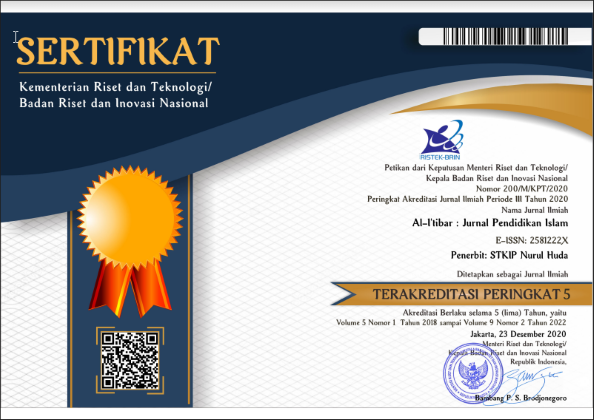Comparison Of Islamic Education Modernization Of Imam Hatip Anatolian Turkish School With Al-Azhar Islamic School 9 Yogyakarta Indonesia
Universitas Islam Indonesia
DOI:
https://doi.org/10.30599/jpia.v11i1.3319Keywords:
Modernization, Islamic Education, Imam Hatip , Turkish SchoolAbstract
The Imam Hatip School is the focus of modern Islamic education by Turkish society. In addition, the purpose of the study is to prove that Islamic schools in Turkey modernize Islamic education in Imam Hatip schools. Of course, Islamic educational institutions present an education system that produces students who have general knowledge and are supported by good religious knowledge. Al-Azhar Islamic High School 9 Yogyakarta Islamic education still maintains its religious identity in the same way as Islamic boarding schools and madrasas, but there are some that have carried out a renewal agenda in response to the guidance of modern times. The consequence of Islamic school education is with high school administration in the modern Islamic Religious Education system today. The modernization of Islamic education in Turkey and Indonesia cannot be separated from the role of reformers who received enlightenment from the modernization movement in the field of education. The modernization aspects that need to be considered in educational institutions include: by adding modern science and Islamic religious science.
Downloads
References
Akpínar, a. (2007). The Making of a Good Citizen and Conscious Muslim through Public Education: The Case of Imam Hatip schools. Education in Multicultural Societies: Turkish and …, 18(September 2006), 161–178. http://books.google.com/books?hl=en&lr=&id=0rOMfwBPHYwC&oi=fnd&pg=PA161&dq=The+Making+of+a+Good+Citizen+and+Conscious+Muslim+through+Public+Education+:+The+Case+of+Imam+Hatip+schools&ots=Xn-QLkmF0E&sig=sSxOfPhRtbZtm5zCUoqkGlBRxU0
Arı, B. (2010). RELIGION AND NATION-BUILDING IN THE TURKISH REPUBLIC: A COMPARISON OF THE HIGH SCHOOL TEXTBOOKS OF 1930-1950 AND 1950 - 1960. International Journal of Development and Management Review, 5(1), 212–224. http://publications.lib.chalmers.se/records/fulltext/245180/245180.pdf%0Ahttps://hdl.handle.net/20.500.12380/245180%0Ahttp://dx.doi.org/10.1016/j.jsames.2011.03.003%0Ahttps://doi.org/10.1016/j.gr.2017.08.001%0Ahttp://dx.doi.org/10.1016/j.precamres.2014.12
Aşlamacı, İ., & Kaymakcan, R. (2017). A model for Islamic education from Turkey: the Imam-Hatip schools. British Journal of Religious Education, 39(3), 279–292. https://doi.org/10.1080/01416200.2015.1128390
Aslanargun, E., Kiliç, A., & Bozkurt, S. (2014). Parental expectation and religious education in state schools in Turkey: The case of Imam Hatip High Schools. International Journal of Instruction, 7(1), 135–150.
Buyruk, H. (2021). The role of religious education in hegemony construction: the case of imam hatip schools in Turkey. Paedagogica Historica, 57(6), 657–674. https://doi.org/10.1080/00309230.2020.1762677
Hanifah Salsabila, U., Shidqi Aghnia, M., Sholihin, A., & Pratiwi, A. (2023). Dinamika Teknologi dalam Pendidikan Agama Islam. Al-I’tibar : Jurnal Pendidikan Islam, 10(1), 01–05. https://doi.org/10.30599/jpia.v10i1.1912
Iswati, & Rohaningsih, C. (2021). Pembelajaran PAI Melalui Pendekatan Humanistik Pada Anak Berkebutuhan Khusus Di Sekolah Inklusi. Jurnal Pendidikan Islam, 8(2), 81–91.
Junaedi, M. (2016). IMAM HATIP SCHOOL (IMAM HATIP LISESI): Islamic School in Contemporary Secular Turkey. Journal of Social Science and Religion.
Kaplick, P. M., Chaudhary, Y., Hasan, A., Yusuf, A., & Keshavarzi, H. (2019). an Interdisciplinary Framework for Islamic Cognitive Theories. Zygon, 54(1), 66–85. https://doi.org/10.1111/zygo.12500
M Hasbi Amiruddin. (2002). THE DEVELOPMENT OF ISLAMIC EDUCATION IN TURKEY. 1299, 1–25.
Mystakidou, K. (2002). Katerina Mystakidou The Broadening of the Islamic Grip on Turkey The 21.
Suprianto, B. (2020). Revitalization of islamic education at the imam hatip school in turkey. ATTARBIYAH: Journal of Islamic Culture and Education, 5(1), 43–59. https://doi.org/10.18326/attarbiyah.v5i1.43-59
Usaleha, A., Lestari, D. M., Sari, W., & Marlina, M. (2020). Isu-isu Pendidikan Islam di Madrasah. Al-I’tibar: Jurnal Pendidikan Islam, 7(1), 28–29. http://journal.unha.ac.id/index.php/JPIA/article/view/1085%0Ahttps://journal.unha.ac.id/index.php/JPIA/article/download/1085/468
Yaşar, A. (2020). Reform in Islamic Education and the AKP’s Pious Youth in Turkey. Religion and Education, 47(4), 106–120. https://doi.org/10.1080/15507394.2020.1828232
Yilmaz, I. (2018). Islamist Educational Policies, Islam and Erdoganist Nation Building in Turkey. SSRN Electronic Journal, August. https://doi.org/10.2139/ssrn.3208040
Yilmaz, I. (2022). Islamist Populist Nation-Building: Gradual, Ad Hoc Islamisation of the Secular Education System in Turkey. Religions, 13(9). https://doi.org/10.3390/rel13090814
Zahoor, T. (2021). A History of Imam Hatip Schools in Turkey : A Transformative Chain of Knowledge in the Contemporary Muslim World. 223–244.
Zengin, M., & Hendek, A. (2023). The Future of Imam Hatip Schools as a Model for Islamic Education in Türkiye. Religions, 14(3). https://doi.org/10.3390/rel14030375
Downloads
Published
How to Cite
Issue
Section
License
Copyright (c) 2024 Danu Firman Setiaji

This work is licensed under a Creative Commons Attribution 4.0 International License.




